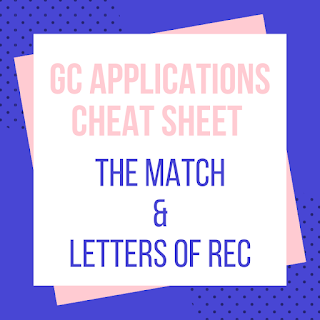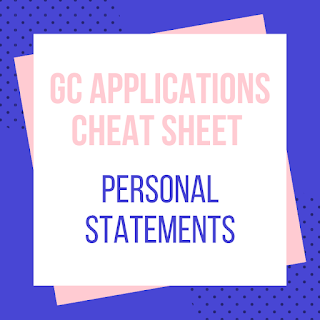GC Applications Cheat Sheet: The Match and Letters of Rec
Once you've decided you're ready to apply to genetic counseling programs, it's really helpful to learn more about the application process and what kinds of things are useful when creating your application, crafting your personal statement, and preparing for interviews! Unfortunately, unlike medical or dental school programs, there aren't prep-books with example interview questions or tips for successful personal statements for genetic counseling programs. But, what I found extremely helpful in preparing for the application and interview process was connecting with genetic counselors, current genetic counseling students, and previous/active applicants. I've been able to gather a ton of really great advice regarding the application process, writing personal statements, and interviewing over the past year, and I am thrilled to share all of that information with you in my new blog series!
In this blog series I am going to break down different aspects of the application process, sharing all the wisdom I've collected from various genetic counselors, students, and previous applicants! Since there is a lot to cover regarding the entire application process, this post is going to specifically focus on getting letters of recommendation and the application itself (specifically, The Match program).
I want to express my gratitude to all of the genetic counselors and genetic counseling students who have shared their wisdom with me. But, I want to give a special shout out to my co-worker, Emily, who heavily contributed to a lot of the information in this post. Emily was recently admitted to a genetic counseling program for admission this fall of 2018, and she was willing to co-write this blog post with me in hopes of helping future applicants!
Before we really get into anything, it is important to understand how the application process works. While each school still has individuals "supplemental" applications, every accredited genetic counseling program will be using The Match. The Match system is an algorithm that is intended to standardize the application process for genetic counseling programs. This past application cycle was the first time this system was used and Emily shared some of her experience:
In this blog series I am going to break down different aspects of the application process, sharing all the wisdom I've collected from various genetic counselors, students, and previous applicants! Since there is a lot to cover regarding the entire application process, this post is going to specifically focus on getting letters of recommendation and the application itself (specifically, The Match program).
I want to express my gratitude to all of the genetic counselors and genetic counseling students who have shared their wisdom with me. But, I want to give a special shout out to my co-worker, Emily, who heavily contributed to a lot of the information in this post. Emily was recently admitted to a genetic counseling program for admission this fall of 2018, and she was willing to co-write this blog post with me in hopes of helping future applicants!
The Match
Before we really get into anything, it is important to understand how the application process works. While each school still has individuals "supplemental" applications, every accredited genetic counseling program will be using The Match. The Match system is an algorithm that is intended to standardize the application process for genetic counseling programs. This past application cycle was the first time this system was used and Emily shared some of her experience:
I thought the Match made the decision-making portion of the application process very efficient. After interviews take place, applicants and programs are asked to rank each other according to their own preferences. The Match uses an algorithm to pair students and programs together while respecting each side’s rankings. If more than one program on an applicant’s list ranks that applicant high on their lists, then the applicant’s rankings will be taken into consideration and they will be matched with the program they rank highest. For more information about the Match, including match statistics from this past cycle, different match tracks, and a video that breaks down the entire process into simpler terms, you can check out their website. The Match designates a universal day when all Match results are released to applicants and programs. I found out about my match result from an email they sent me early that day. The advantage of having this new system in place is that it eliminates the wait list and cuts down on the waiting time for applicants to find out whether or not they have been placed in a program; however, since accepted applicants are bound to a program with the Match, it’s important that applicants carefully review their program rankings before finalizing them. Even if a program is ranked last on an applicant’s list, there is a chance that the applicant will still have to attend that program.The Match opened registration for applicants in September, which is important when thinking about the application timeline. For more information regarding The Match, please visit their website.
There is also an unmatched pool where applicants who are registered in the Match system, but not matched on Match day, are placed. These applicants are eligible to apply to any remaining vacant positions in programs and are notified about this opportunity after the Match. The criteria for eligibility has changed recently, so I would recommend checking the Match’s website for details about the unmatched pool.
Letters of Recommendation
Most programs have specifics on what they expect to see from student's letters of recommendation, so it is important to know what your specific programs require. A few of the programs I am applying to require a letter of recommendation from a genetic counselor, who can speak to my shadowing experience, which really emphasizes the importance of making connections with genetic counselors and trying obtain shadowing or information interview opportunities.
So, in addition to asking a genetic counselor for a letter, I have also asked two former professors for letters of recommendation; however, I wanted to highlight that I purposefully asked a biochemistry professor and a professor of interdisciplinary studies. This was important to me because I felt that a letter from my interdisciplinary studies professor would help to emphasize my differences as an applicant, and reinforce my research goals towards diversity and accessibility of the field. Furthermore, I felt that my interdisciplinary studies professor could really speak to my empathy and compassion for others, as many of the courses I took with him inspired me to work towards social justice and equality.
Emily shared some of her reasoning behind who she chose to write her letters of recommendation:
I picked writers who I believed would have more to say about my character and my compatibility with a career in genetic counseling. I asked a professor in my major’s department whom I previously took two classes with. My other two letters came from a genetic counselor I shadowed for about a year and a supervisor I worked with several summers in a row during a research internship. Since these writers were able to observe how I worked alone and with others, as well as how I made progress and conducted my work over a length of time, I thought they were qualified to speak on my behalf as a student. When looking for potential letter writers, it’s a good idea to visit each professor or supervisor in person to discuss the request. Showing up prepared with your reasoning for applying to graduate school and other material that may help them write strong letters of recommendation for you (past grades, old reports, a resume/CV, a draft of your personal statement, a list of schools and respective deadlines, a cover letter, etc.) will make the letter writing process a lot more convenient for your writers, especially if they haven’t seen you recently.
It is important when preparing to ask your professors and mentors for letters of recommendation, that you're considerate of their schedules. Chances are, these people are asked very often to write letters of recommendation, and it is better to ask in advance, so they don't feel rushed, and are able to dedicate more time towards writing your letter of recommendation. I graduated in May of 2017, and after speaking to a career counselor, I decided it was best for me to ask my professors in advance so that during my gap year I could continue to stay in touch with them and update them on what I was doing, and they didn't feel rushed on blind-sided when the time came for them to submit a letter of recommendation.
I asked my professors only a few months after I graduated, knowing that I would not need them to submit a letter for another year and a half, Emily had a different process:
I took a gap year before applying to programs, so I did have to make an effort to reconnect with some of my writers and update them on experiences I gained during my time away from school. If I could change anything about my approach to the application process, I would have asked for letters of recommendation sooner, possibly at the end of the summer or around the beginning of the school year. Although I requested letters of recommendation two months before application deadlines, which still provides a decent amount of time for writers to complete their letters, university faculty members may be preoccupied with their current students and communication will understandably not be as consistent due to their academic plans. Being mindful of your writers’ busier schedules and asking for letters early would definitely alleviate some of the stress of getting letters in on time, especially since this part of the application is dependent on others and not so much on the applicant.
Hopefully this advice was helpful for you! In later installations of this series, Emily and I will share more about writing a personal statement and the interview process. If you have any questions or more advice, please share them in the comments!



Great Info!!! Thanks for sharing information with us. If someone wants to know about Taxi Application and Taxi Booking Solutions I think this is the right place for you.
ReplyDeleteReally, it is of great value to us. The information you have shared is really useful for everyone. If anyone wants to know about GC Sheets. I think this is the right place for you.
ReplyDelete